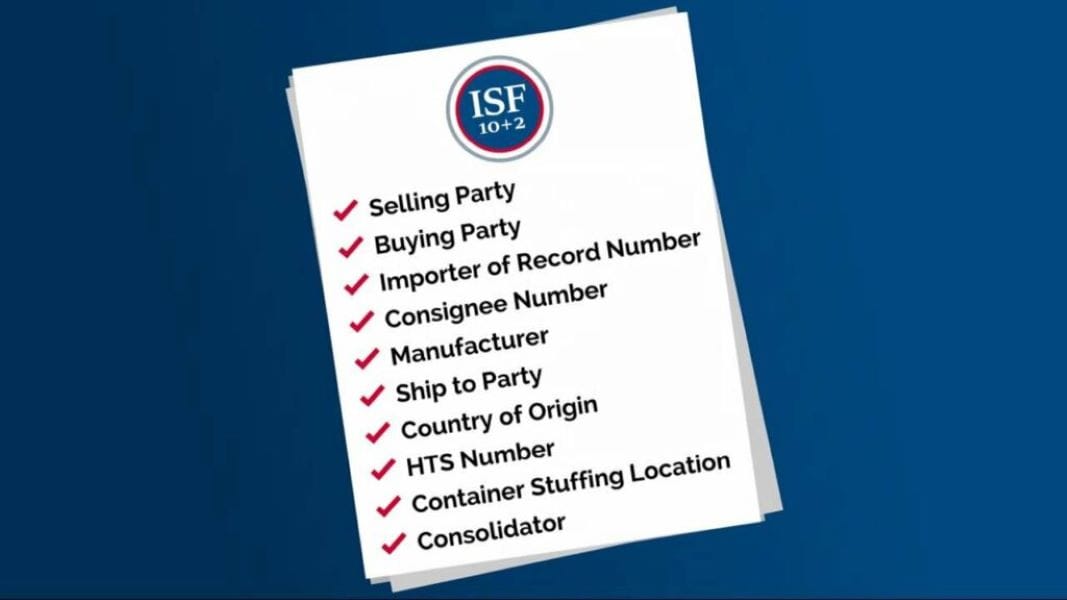In international trade, ISF refers to a detailed declaration document that the importer or its agent must submit before the goods enter the United States. This article will introduce it in detail for companies that Shipping from China to USA.
Learn more: The 11 Common International Trade Terms

What is ISF
ISF, the full name of which is Importer Security Filing, is a requirement of the U.S. Customs for U.S. importers. ISF is also known as the “10+2” declaration because it requires the submission of 10 data provided by the importer and 2 data provided by the shipping company.
Features of ISF
ISF can improve the import security of the United States and prevent illegal goods (such as contraband, counterfeit goods, etc.) from entering the U.S. market. In addition, ISF also helps to strengthen the U.S. Customs’ risk assessment of goods and optimize the customs clearance process to reduce unnecessary delays and inspections.
- Enhance security: By obtaining detailed cargo information in advance, customs can better assess risks and ensure national security.
- Reduce customs clearance delays: Compliance with ISF declarations can help speed up the customs clearance process of goods and reduce unnecessary detentions or inspections.
- Comply with regulatory requirements: Importers who comply with ISF regulations can avoid compliance issues such as fines and penalties.
How to Submit ISF?
ISF can be submitted through the customs automated system, usually by the importer, customs broker or freight forwarder. Submission methods include:
- Submit electronically: ISF declarations must be submitted through CBP’s Automated Commercial Environment (ACE) system. Importers can fill in and submit ISF in the ACE system.
- Submit through an agent: Importers can entrust customs brokers or freight forwarders to submit ISF.
- Submit through a third-party service provider: Some companies also provide ISF declaration services, which can be completed through a third-party service platform.
Requirements for ISF Declaration
ISF declaration needs to include the following basic information:
- Shipper information: including the name and address of the shipper.
- Consignee information: including the name and address of the consignee.
- Importer information: including the name and address of the importer.
- Supplier information: including the supplier information of the goods.
- Commodity description: detailed description of the goods, including quantity, specifications, product name, etc.
- HS code (customs code): each commodity needs to provide the corresponding customs code.
- Transportation mode information: including transportation mode, voyage, estimated time of arrival, etc.
- Container number and voyage number: including container number, voyage number
ISF applies to all Sea freight imported from foreign countries to USA, not Air freight, and importers or their agents must submit ISF before the goods are loaded. Specifically, ISF declaration must be completed 24 hours before the sea container is loaded.

Consequences of ISF Noncompliance
Failure to comply with ISF filing regulations can result in serious consequences, including:
Penalties
Customs may impose fines for noncompliant filings, and U.S. Customs can assess up to $10,000 per shipment for various violations. Here is a general breakdown:
- Failure to file an ISF – $5,000 per shipment
- Late submission of an ISF – $5,000 per shipment
- Incomplete ISF filing – $5,000 per shipment
- Failure to pick up an ISF – $5,000 per shipment
- Failure to match an ISF filing to a bill of lading – $5,000 per shipment
Delays
Noncompliant ISF filings can result in delayed customs clearance of goods, increasing shipping costs.
Cargo Detentions
Customs has the right to detain goods or even refuse entry if the declaration is not compliant.
Increased Audits
ISF noncompliance can also result in more stringent inspections and scrutiny, adding complexity to the entire shipping process.
Frequently Asked Questions about ISF
Who is responsible for ISF declaration?
The responsible party for ISF declaration is usually the importer, but if the final destination of the goods is not a US port, but the ship will call at a US port before the goods are unloaded, or if the US counterpart is responsible for import arrangements, you may need to contact the relevant shipping company or pay attention to the relevant notification of the shipowner.
Can the ISF declaration be modified?
Under certain conditions, the ISF declaration can be modified. However, the modification needs to follow the relevant regulations and procedures of the US Customs and may require additional fees.
What is the relationship between ISF declaration and customs clearance?
ISF declaration is an important link before the customs clearance of goods. Only when accurate and complete ISF declaration information is submitted can the goods enter the customs clearance process smoothly.
